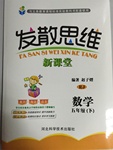题目内容
Who has ________ oranges. Jim or Tom?
- A.few
- B.fewer
- C.fewest
- D.the fewest
精析:本题是Jim和Tom二个人在比较谁的橙子少,应用比较级。

 发散思维新课堂系列答案
发散思维新课堂系列答案
London has a new magazine. But it is not printed(印刷) on paper. Everyone who has a television can receive it because it is on TV.
In order to read this magazine you have to have a decoder (解码器). Each page of it is numbered, so you only have to dial the number to choose which subject you want to read about. There are all kinds of information ---everything is included from cooking to the latest sports news.
If you want to read the news, the first thing you have to do is to turn to the back page, which has an easy-to-remember page number, 100 for example. Then you start choosing what you want to read. The news is on page 101 to 109, so you put in the numbers and the news appears written across your screen. Perhaps you want to go out in the afternoon, so you press 181, and a brightly colored weather map appears on the screen. But the weather is terrible, so you decide to go shopping and dial 162 for a list of the week’s best bargains. But should you drive or take the train? To answer that question you only have to press 189 for the traffic report. It is very simple to use. But probably the best thing about the service is that it is being updated all the time. Journalists type new material directly onto the screen and the whole pages of the magazine can be replaced in minutes.
London already has three services. One, sent out by TV, is called ORACLE while the other two, on BBC, are called CEEFAX because they let you see facts. Although CEEFAX and ORACLE have been operating for some time, they have not been well publicized(宣传). BBC engineers do not think that their idea will ever replace books and newspapers because they can be taken with you everywhere. But many people would agree that is a breakthrough(突破) as great as the invention of printing, which could not just change our reading habits but our whole way of life.
【小题1】 We can know from the passage that in London .
| A.the magazine is available at any local home |
| B.most of the postmen will lose their jobs some day |
| C.everyone can read this magazine if they have a television |
| D.the readers can get various kinds of information staying at home |
| A.magazine | B.program | C.decoder | D.subject |
| A.work out the total(合计) of certain numbers |
| B.read the information sent by TV signals |
| C.go shopping and have other entertainment |
| D.receive some special TV program for entertainment |
| A.a new magazine printed in London |
| B.an up-to-date way of getting information |
| C.a popular TV program about magazines |
| D.an advanced technology helping people communicate |
Som etimes people call ours a “throwaway society”. That means that we’re always throwing away old things and buying new ones. Many times, you no longer need something, but someone else may just need to buy one. For example, if your baby doesn’t like his toy car any longer, why not give it to a nearly family who has a little kid? That’s one less plastic toy car that they need to buy. It’s also one less plastic toy that needs to be produced, packaged and shipped to the toy store.
etimes people call ours a “throwaway society”. That means that we’re always throwing away old things and buying new ones. Many times, you no longer need something, but someone else may just need to buy one. For example, if your baby doesn’t like his toy car any longer, why not give it to a nearly family who has a little kid? That’s one less plastic toy car that they need to buy. It’s also one less plastic toy that needs to be produced, packaged and shipped to the toy store.
Here are some other ways to help save resources (资源)for the society:
★Use the other side of the paper.
★Use rechargeable (可再充电的) batteries for your electric toys, MP3 players, cell phones, and cameras.
★ Choose reusable travel cups instead of disposable (一次性的) paper or plastic cups.
★Take your own cloth shopping bags when you go shopping.
★ Drink tap water instead of buying bottled water.
And there are some things you can exchange with your friends, for example, books, toys, even clothes. It's a way for everyone to get something new without spending any money and without throwing many things away.
【小题1】The und erlined word "ours" in the passage refers to (指代) _______.
erlined word "ours" in the passage refers to (指代) _______.
| A.our society | B.our old things |
| C.our life | D.our throwaway things |
| A.buy another new one | B.help toy business develop |
| C.make the family very thankful to us | D.help save resources for the society |
| A.We should buy things that can be reused in our daily life. |
| B.We can exchange some things with others for further use. |
| C.It's good for us to throw away old things and buy new ones. |
| D.We are supposed to give the things we no longer need to our neighbors. |
| A.Try to throw as few old things as we can. |
| B.Use as many disposable things as possible. |
| C.Drink bottled water even though there is tap water around. |
D.Buy everything we need instead of exchang ing them with others. ing them with others. |